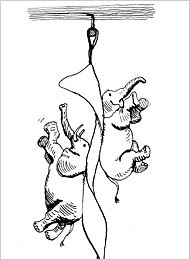Frank Rich — They sure showed him.
AM I crazy, or wasn’t the Obama presidency pronounced dead just days ago? Obama had “all but lost control of the agenda in Washington,” declared Newsweek on Feb. 4 as it wondered whether he might even get a stimulus package through Congress. “Obama Losing Stimulus Message War” was the headline at Politico a day later. At the mostly liberal MSNBC, the morning host, Joe Scarborough, started preparing the final rites. Obama couldn’t possibly eke out a victory because the stimulus package was “a steaming pile of garbage.”
Less than a month into Obama’s term, we don’t (and can’t) know how he’ll fare as president. The compromised stimulus package, while hardly garbage, may well be inadequate. Timothy Geithner’s uninspiring and opaque stab at a bank rescue is at best a place holder and at worst a rearrangement of the deck chairs on the TARP-Titanic, where he served as Hank Paulson’s first mate.
But we do know this much. Just as in the presidential campaign, Obama has once again outwitted the punditocracy and the opposition. The same crowd that said he was a wimpy hope-monger who could never beat Hillary or get white votes was played for fools again.
[…]
This G.O.P., a largely white Southern male party with talking points instead of ideas and talking heads instead of leaders, is not unlike those “zombie banks” that we’re being asked to bail out. It is in too much denial to acknowledge its own insolvency and toxic assets. Given the mess the country is in, it would be helpful to have an adult opposition that could pull its weight, but that’s not the hand America has been dealt.
As Judd Gregg flakes out and Lindsey Graham throws made-for-YouTube hissy fits on the Senate floor, Obama should stay focused on the big picture in governing as he did in campaigning. That’s the steady course he upheld when much of the political establishment was either second-guessing or ridiculing it, and there’s no reason to change it now. The stimulus victory showed that even as president Obama can ambush Washington’s conventional wisdom as if he were still an insurgent.
But, as he said in Fort Myers last week, he will ultimately be judged by his results. If the economy isn’t turned around, he told the crowd, then “you’ll have a new president.” The stimulus bill is only a first step on that arduous path. The biggest mistake he can make now is to be too timid. This country wants a New Deal, including on energy and health care, not a New Deal lite. Far from depleting Obama’s clout, the stimulus battle instead reaffirmed that he has the political capital to pursue the agenda of change he campaigned on.
Republicans will also be judged by the voters. If they want to obstruct and filibuster while the economy is in free fall, the president should call their bluff and let them go at it. In the first four years after F.D.R. took over from Hoover, the already decimated ranks of Republicans in Congress fell from 36 to 16 in the Senate and from 117 to 88 in the House. The G.O.P. is so insistent that the New Deal was a mirage it may well have convinced itself that its own sorry record back then didn’t happen either.
The New Newt — Rep. Eric Cantor (R-VA) is setting himself up as the next leader of the GOP insurgency.
The last time Congressional Republicans were this out of power, they turned to a college professor from Georgia, Newt Gingrich, to lead the opposition, first against President Bill Clinton in a budget battle in 1993, and then back into the majority the following year.
As Republicans confronted President Obama in another budget battle last week, their leadership included another new face: Representative Eric Cantor of Virginia, who as the party’s chief vote wrangler is as responsible as anyone for the tough line the party has taken in this first legislative standoff with Mr. Obama. This battle has vaulted Mr. Cantor to the front lines of his party as it tries to recover from the losses of November.
As Republican whip, Mr. Cantor succeeded again on Friday in denying the White House the support of a single House Republican on the stimulus bill. That was a calculated challenge to the president, who, in his weekly address on Saturday, hailed the bill as “an ambitious plan at a time we badly need it.”
Mr. Cantor said he had studied Mr. Gingrich’s years in power and had been in regular touch with him as he sought to help his party find the right tone and message. Indeed, one of Mr. Gingrich’s leading victories in unifying his caucus against Mr. Clinton’s package of tax increases to balance the budget in 1993 has been echoed in the events of the last few weeks.
“I talk to Newt on a regular basis because he was in the position that we are in: in the extreme minority,” he said.
The Republicans can certainly count some victories, although symbolic ones. Even White House aides said Mr. Cantor and his team had been successful in seizing on spending items in the stimulus bill to sow doubts about it with the public.
History records that Bill Clinton played Newt Gingrich like a fish on a line, and in the end it was Mr. Gingrich who resigned from the House after being tossed out on his ass by the Republican leadership for his troubles. Mr. Obama is at least as skilled a politician as Mr. Clinton, and while Mr. Cantor may not have the personality quirks or the rank hypocrisy of Mr. Gingrich, he’s going to have to prove that he can match the craft and grace of Mr. Obama. So far, just saying “No” isn’t going to cut it; he’s going to have to come up with viable alternatives to Mr. Obama’s agenda, and so far, the GOP hasn’t got it.
Minnesota Limbo — The unresolved election for the Minnesota senate seat leaves Al Franken and Norm Coleman betwixt and between.
The state’s canvassing board last month declared Franken the winner of a recount by a 225-vote margin, but Coleman has sued to challenge the results, placing the final outcome of November’s election before the courts, in a trial that could last several more weeks.
With no winner declared, Franken spent two days in Washington last week learning about arcane Senate procedures such as the anonymous hold, while his Democratic colleagues shaved billions of dollars from their stimulus proposal in the hope of capturing from Republicans one of the votes that Franken otherwise could have provided. Earlier, as the Senate debated one of the most expensive bills in history, Franken was grounded in his home state watching streaming video of the court proceedings involving the Minnesota seat on http://TheUpTake.org.
Coleman, for his part, worked the phones last week from the Washington offices of the National Republican Senatorial Committee, up the street from the Capitol, and held a fundraiser Wednesday for his legal effort that drew more than a dozen Republican senators, several of whom directed their political action committees to donate the $10,000 maximum to his post-election campaign.
“It’s a little difficult and frustrating,” Coleman said in a phone interview.
That holds true for the residents of Minnesota, as well, who now find that when a Social Security check comes late or they need some other service, there is no one to call but Amy Klobuchar (D), the only senator from the state with a working staff. Klobuchar said she is considering asking the Senate to give her more staffers if the legal battle between Franken and Coleman drags on, because she is getting almost double the requests that she normally does.
Franken smiles but leaves aside his funnyman persona when asked about his plight.
“I’m really eager to get to work,” Franken said last week, as he dragged a black carry-on bag to the offices of the Democratic Senatorial Campaign Committee, where he works when he is in town. “Having a 59th vote would have changed the dynamic” on the stimulus, he said, making reference to the 60 Democratic votes needed in the Senate to prevent a filibuster by Republicans.
Coleman said, “These are the most challenging economic times of my life, and I want to be involved in this discussion,” adding: “What I’m left with is the op-ed.”
Meanwhile, the Republicans are doing everything they can to keep Coleman’s hopes alive, including recycling all the arguments Al Gore used in 2000 to make his case for counting all the votes. I am glad to see that the Republicans have not lost their gift of irony.
Leonard Pitts, Jr. — Following up on this post, Mr. Pitts calls out Jackson Memorial Hospital.
Your wife is dying.
One moment everything was fine. You were in your stateroom on the cruise ship — it was to be an anniversary cruise — unpacking your things. The kids were in the adjoining stateroom playing with your wife. Suddenly, they banged on the door crying that mom was hurt.
So now you’re in the hospital — Ryder Trauma Center at Jackson Memorial Hospital — waiting for word, and it’s not coming. They tell you, Joe (we’ll call you Joe), you can’t be with her. You plead with them, to no avail. No, Joe, sorry, Joe, we can’t tell you anything.
One hour turns to two, two to four, four to six. Your wife is dying, and no one she loves is there.
Finally, in the eighth hour, you reach her bedside. You are just in time to stand beside the priest as he administers last rites.
Your wife is dead. Her name was Lisa Marie Pond. She was 39.
It happened, Feb. 18-19, 2007, except that Pond’s spouse was not a man named Joe, but a woman named Janice. And there’s one other detail. Janice Langbehn who, as it happens, is an emergency room social worker from Lacey, Wash., says the first hospital employee she spoke with was an emergency room social worker. She thought, given their professional connection, they might speak a common language.
Instead, she says, he told her, ”I need you to know you are in an anti-gay city and state, and you won’t get to know about Lisa’s condition or see her” — then turned and walked away.
For the record, this is an increasingly anti-gay nation, to judge from all the mean-spirited amendments and legislation that have made scapegoats and boogie men of them in recent years, including Florida’s Marriage Protection Amendment, which passed last November.
The Jonny Quest Quest — Can Hollywood pull off a live-action version of Jonny Quest?
One of the more intriguing popcorn-movie scripts floating around town right now is Dan Mazeau’s rollicking live-action adaptation of “Jonny Quest,” the savvy and sublime 1960s animated adventure series that felt like “Dr. No” for kids or a post-Sputnik version of “Terry and the Pirates.”
The old show was flat-out great and the word is that Mazeau’s script is such a nimble revival effort that little Jonny could end up being a 21st century movie franchise.
The script made it on to the 2008 Black List (not that I’m vouching for purity or ongoing relevance of that particular industry poll) and it also got Mazeau the job writing the screenplay for the planned movie adaptation of Flash, the DC Comics hero.
I, for one, hope Mazeau’s script reaches the screen because as a youngster I was fascinated by “Jonny Quest” reruns and their stylish danger and refreshing tone. I was watching them in the 1970s, but the old shows (which originally aired in 1964 and 1965) had a worldly, engaging spirit that set them apart from cartoons that talked down to their young audience. There was a dash of both Ian Fleming and Rudyard Kipling in sensibility of the series, which many people forget was originally aired in prime-time, following in the footsteps of Hanna-Barbera’s other more iconic series, “The Flintstones.” (The first “Jonny Quest” episode, by the way, premiered on ABC four days before “Goldfinger” opened at U.S. theaters.)
Doonesbury — Legacy.


















































